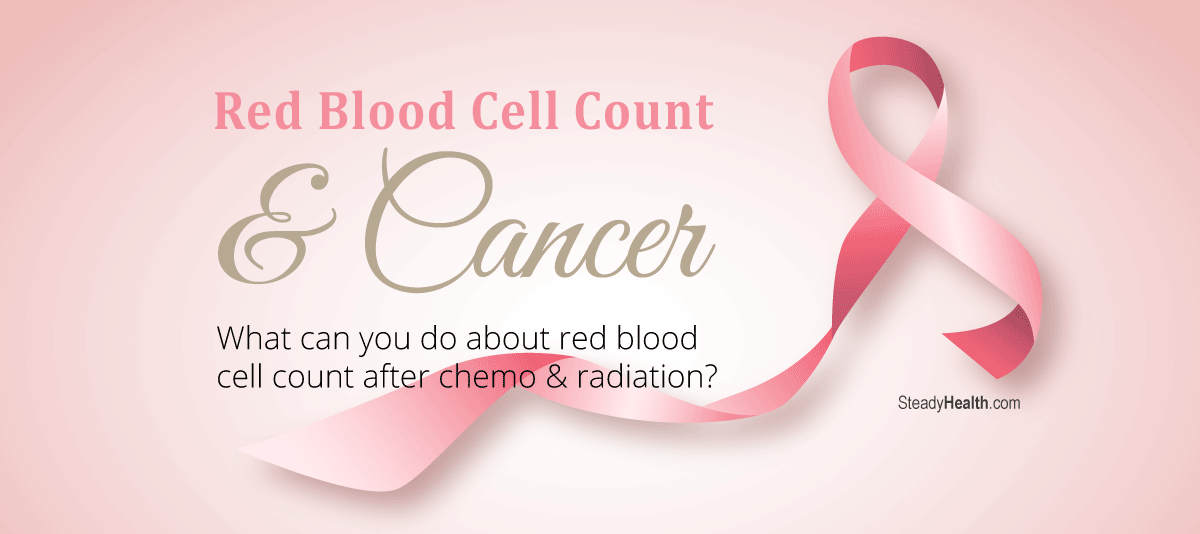Tammy had made it through six treatments with the breast cancer drug trastuzumab (Herceptin) in six weeks. Then she had somehow survived another six treatments with paclitaxel (Taxol) in twelve weeks. Most recently, Tammy was told that she needed a treatment with trastuzumab every single week for the next year, but her body was practically screaming "No more!"
The Herceptin had made her nauseous with feelings like she was coming down with the flu, but she knew she needed it to beat the cancer, so she kept taking it.

The Insidious Symptoms of Low Red Blood Cell Count and Cancer
The treatment with Taxol hadn't been quite as bad, but she had started feeling fatigued, really fatigued. She was out of breath going up the three steps from her garage to her mud room. She had laid down after folding clothes for a few minutes. Going back to work was completely out of the question. Tammy's hair had not completely fallen out, but it was brittle, and all the flu-like symptoms she had suffered with Herceptin had come back with a vengeance.
How was she going to tolerate the drug regimen her oncologist insisted was necessary to save her life for an entire year?
Red blood cells contain hemoglobin. Hemoglobin carries oxygen throughout the body. When high hemoglobin levels are decimated along with a plummeting red blood cell count, the effect is something like being slowly smothered all the time. Your actual symptoms, if you developed anemia after chemotherapy, will include some that chemo and cancer will already cause, making matters even worse. People with serious anemia will feel extremely fatigued, may be short of breath, have a rapid heart beat, and will have paler skin.
What Can You Do About Red Blood Cell Count After Chemo and Radiation
Doctors usually offer erythropoietic drugs to stimulate red blood cell production, but there are also things you can do on your own to increase your red blood cell count and your quality of life while going through chemotherapy.
Don't suffer silently.
Erythropoietic drugs don't always work very well. It doesn't do a lot of good to be taking a hormone to increase red blood cell production if your body can't support the higher hemoglobin levels those red blood cells need. If you don't feel better as expected, you need blood tests sooner rather than later. [1] Don't keep on tolerating the symptoms your lowered red blood cell count is inducing, and ask your doctor to test you immediately.
Don't take iron supplements or eat iron-rich foods unless you know from a blood test that your iron levels are low.
Anemia symptoms are not necessarily iron deficiency signs. It's possible to have both cancer and hemochromatosis, a condition of high iron levels that causes, among other things, cancer, so you should not try to get extra iron unless you know from a blood test that you are deficient in iron [2].
Do get more iron if your blood tests (for iron, not just for RBC or hemoglobin) show you need it.
It bears repeating: an RBC count or a hematocrit or a hemoglobin level is not the same as an iron test. If you are iron levels are low, however, your body can't make the hemoglobin that powers red blood cells to carry oxygen. If you are on an erythropoietic medication like Aranesp, Epo, Epogen, Epoetin alfa, Epoetin beta, NeoRecormon, or Micera, then it's probably best to get your iron through an IV, not from supplements [5]. But if you're not, most people recovering from anemia induced by chemotherapy respond best to a form of iron known as ferrofumarate [6]. Food just won't give the iron you need as quickly as your body needs it.
What about anemia after radiation therapy?
A study at Beth Israel Medical Center and St. Luke's-Roosevelt Hospital Center in New York City found that 51 percent of men and 64 percent of women had anemia at the end of radiation treatment for cancer [7].
Vitamin D may protect against the development of cancers of the skin as a result of radiation injury [10], and many people benefit from supplementation.
Omega-3 essential fatty acids may likewise protect against the development of new cancers as a result of exposure to radiation [11]. But that doesn't mean that more is always better. You really don't need more than 10,000 IU of vitamin D per day, and taking more than 10 g of fish oil can produce fatty acid byproducts that actually undo the benefits of lower doses.
You will notice that there isn't a long list of healthy foods people should eat after radiation or chemotherapy for iron deficiency treatment. That's because eating any kind of food tends to be a chore after cancer treatment. You will get better results with targeted iron therapies, either from your doctor or the very best iron supplements, with eating as best you can while you recover.
- Photo courtesy of SteadyHealth.com


Your thoughts on this